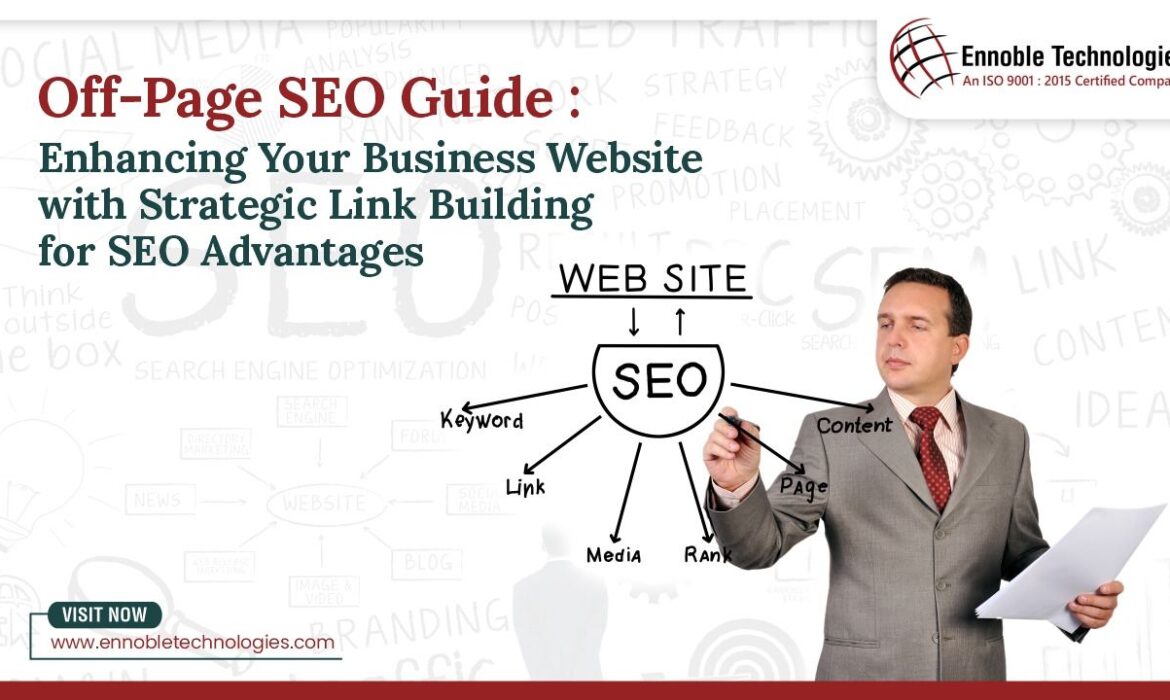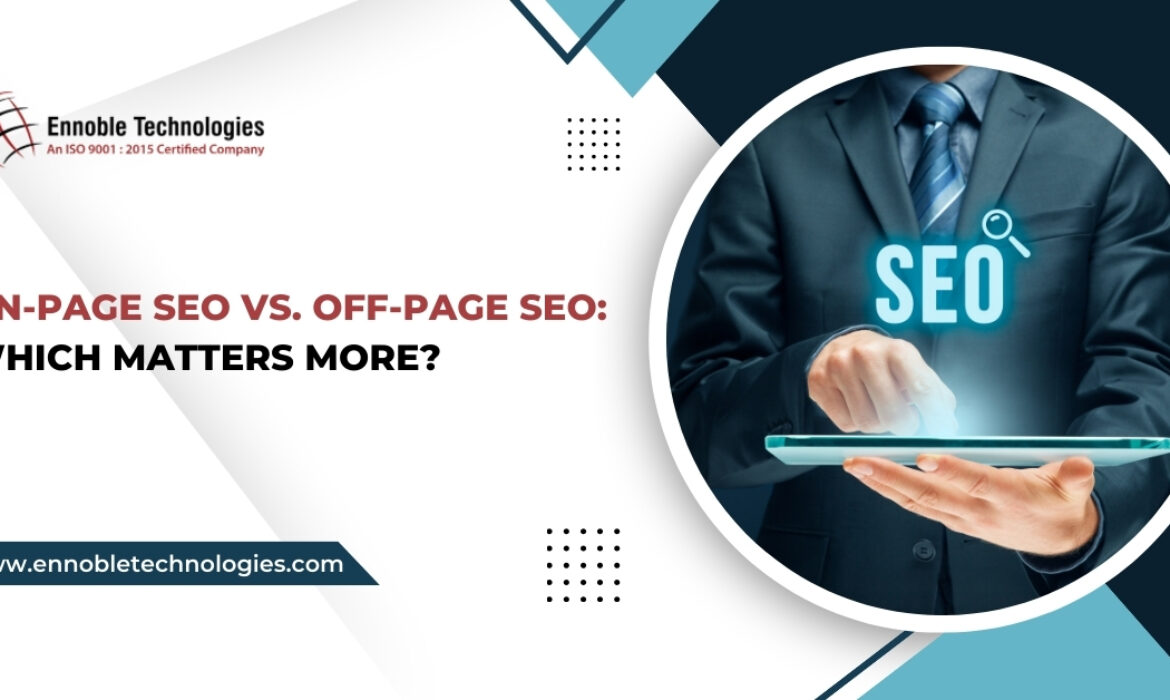Off-Page SEO Guide: Enhancing Your Business Website with Strategic Link Building for SEO Advantages
Introduction
In the world of digital marketing, Off-Page SEO plays a critical role in enhancing the visibility and ranking of websites on search engine results pages (SERPs). It focuses on optimizing factors outside the website itself, such as link building and online reputation management. Let’s delve deeper into the realm of Off-Page SEO and discover how strategic link building and other techniques can significantly impact your business’s online presence.
Understanding Off-Page SEO : A Beginner’s Guide
What is Off-Page SEO?
Off-Page SEO refers to optimization efforts that occur outside the boundaries of a website. It involves activities aimed at improving the website’s authority, relevance, and trustworthiness in the eyes of search engines. These efforts are crucial because search engines like Google consider external factors to determine a website’s credibility and rank it accordingly on SERPs.
One of the primary goals of Off-Page SEO is to acquire high-quality backlinks from reputable websites. These backlinks act as votes of confidence for your site, signaling to search engines that other sites trust your content enough to link back to it. As a result, your website’s authority and visibility increase, leading to higher rankings and organic traffic.
Importance of Off-Page SEO:
Off-Page SEO plays a pivotal role in enhancing your website’s visibility and authority on search engines. It focuses on external factors like backlinks, social signals, and brand mentions that contribute to your site’s overall reputation. By implementing effective Off-Page SEO strategies, you can improve your search engine rankings, attract organic traffic, and boost brand credibility.
Difference Between On-Page and Off-Page SEO:
On-Page SEO involves optimizing individual web pages for search engines by optimizing content, meta tags, and internal linking. In contrast, Off-Page SEO focuses on external factors such as backlinks, social media engagement, and online reputation management. While On-Page SEO is about optimizing the structure and content of your website, Off-Page SEO aims to increase your site’s authority and trustworthiness through external signals.
Types of Off-Page SEO Techniques:
a. Link Building: Acquiring quality backlinks from authoritative websites is a fundamental Off-Page SEO technique.
b. Social Media Engagement: Actively engaging with your audience on social media platforms can boost brand visibility and generate social signals.
c. Content Marketing: Creating valuable and shareable content like infographics, videos, and blog posts can attract natural backlinks.
d. Influencer Outreach: Collaborating with influencers can expand your reach and attract relevant traffic to your site.
e. Local SEO: Optimizing your online presence for local searches through local directories and Google My Business is crucial for local businesses.
Importance of Backlinks in SEO: Basics and Benefits
Backlinks are incoming hyperlinks from one webpage to another. They are a fundamental aspect of Off-Page SEO and hold significant weight in search engine algorithms. Search engines view backlinks as endorsements or votes of confidence for a website’s content. The more high-quality backlinks a site has, the more authority and credibility it gains in the eyes of search engines.
There are two main types of backlinks: Dofollow and Nofollow. Dofollow links pass link equity and contribute to a website’s SEO rankings. On the other hand, Nofollow links do not pass link equity but can still drive traffic and improve brand visibility.
Quality backlinks offer several benefits for SEO, including improved search engine rankings, increased organic traffic, enhanced online visibility, and greater trust and authority. However, it’s essential to focus on acquiring natural and relevant backlinks from authoritative sources to maximize these benefits.
Anchor Text Optimization: Beginner to Advanced Techniques
Anchor text plays a crucial role in Off-Page SEO, as it provides context and relevance to the linked content. Optimizing anchor text involves using relevant keywords or phrases that accurately describe the linked page’s content. This optimization helps search engines understand the content’s topic and improves the linked page’s ranking for those keywords.
Beginners can start by using descriptive anchor text that clearly indicates what the linked page is about. As you advance, consider using variations of anchor text, including exact match, partial match, branded, and generic anchor text. Diversifying anchor text types and incorporating long-tail keywords can enhance link relevance and improve SEO performance.
Directory Submissions Demystified: Step-by-Step Guide
Directory submissions are a common Off-Page SEO technique used to improve website visibility and generate backlinks. Directories are online platforms that categorize and list websites based on their niche or industry. Submitting your website to relevant directories can enhance its online presence and attract potential visitors and customers.
To submit your website to directories effectively, follow these steps:
- Research and identify reputable directories in your industry.
- Ensure your website meets the directory’s submission guidelines.
- Create a compelling and informative listing for your website.
- Submit your website to the selected directories, providing accurate and up-to-date information.
- Regularly monitor and update your directory listings to maintain accuracy and relevance.
By following this step-by-step guide, you can leverage directory submissions to boost your website’s visibility and attract valuable traffic.
Unlocking Off-Page SEO: Mastering Strategic Link Building for Business Growth

In today’s competitive digital landscape, Off-Page SEO plays a pivotal role in enhancing your website’s visibility and driving organic traffic. As businesses strive to optimize their online presence, understanding the nuances of Off-Page SEO becomes imperative. In this comprehensive guide, we delve into key Off-Page SEO strategies, including guest blogging, social bookmarking, harnessing social signals, influencer marketing, and PR outreach.
Guest Blogging Essentials: How to Get Started
Guest blogging is a powerful Off-Page SEO technique that not only helps in acquiring backlinks but also establishes your authority in your industry. By contributing valuable content to reputable websites, you can reach a wider audience and drive targeted traffic to your site. Here’s how to kickstart your guest blogging journey.
Introduction to Guest Blogging and its Benefits for SEO
Guest blogging involves writing and publishing content on other websites as a guest contributor. It offers several benefits for SEO, including building backlinks, increasing brand exposure, and improving search engine rankings.
How to Find Guest Blogging Opportunities in Your Niche
Start by researching websites in your niche that accept guest posts. Use search engines and social media platforms to identify potential opportunities. Look for websites with a strong domain authority and engaged audience.
Tips for Writing a Successful Guest Blog Post and Outreach Strategies
When crafting your guest blog post, focus on providing valuable, informative content that resonates with the target audience of the hosting site. Personalize your outreach emails to site owners, highlighting the value you can offer through your guest post.
Social Bookmarking Strategies: Tips for Success
Social bookmarking is another effective Off-Page SEO strategy that involves bookmarking your website or content on social bookmarking platforms. Here’s how to leverage social bookmarking for SEO benefits.
Explanation of Social Bookmarking and its Relevance in SEO
Social bookmarking platforms allow users to save, organize, and share web pages. These platforms have high domain authority, making them ideal for creating backlinks and improving website visibility.
Benefits of Social Bookmarking for Improving Website Visibility
Social bookmarking helps in generating backlinks, driving referral traffic, and increasing online visibility. It also enhances your website’s authority and credibility in the eyes of search engines.
Tips and Strategies for Effective Social Bookmarking
Choose relevant and popular social bookmarking platforms to share your content. Optimize your bookmarks with catchy titles, descriptions, and relevant keywords. Engage with other users’ bookmarks and participate in relevant communities to maximize your reach.
Harnessing Social Signals for SEO: Beginner’s Overview

Social signals refer to the metrics related to social media engagement, such as likes, shares, comments, and social media mentions. These signals can influence search engine rankings and online visibility. Here’s how to harness social signals for SEO success:
Understanding Social Signals and their Impact on Search Rankings
Social signals indicate the popularity and relevance of your content on social media platforms. Search engines consider social signals as a measure of user engagement and content quality, which can impact search rankings.
Importance of Social Signals in SEO and How They are Measured
Social signals contribute to building brand authority, driving traffic, and improving search engine visibility. Metrics like social shares, likes, comments, and follower growth are used to measure social signals’ effectiveness.
Strategies to Increase Social Signals and Monitor their Effectiveness
Create shareable and engaging content that encourages social media interactions. Use social media analytics tools to track social signals and monitor the performance of your social media campaigns. Encourage audience participation and interaction to boost social signals.
Influencer Marketing for Link Building: Getting Started Guide
Influencer marketing involves collaborating with influential individuals in your industry to promote your brand, products, or services. This strategy not only helps in building backlinks but also expands your reach and credibility. Here’s how to leverage influencer marketing for link building.
Introduction to Influencer Marketing and its Benefits for SEO
Influencer marketing allows you to tap into the existing audience of influencers and leverage their authority and credibility to promote your brand. It can result in quality backlinks, increased brand awareness, and improved search engine rankings.
How to Find and Engage with Influencers in Your Industry
Identify relevant influencers in your niche using social media platforms, influencer marketing tools, and industry directories. Build relationships with influencers by engaging with their content, offering value, and showcasing mutual benefits.
Collaborating with Influencers for Link Building and Measuring ROI
Collaborate with influencers on content creation, guest blogging, product reviews, or sponsored campaigns that include backlinks to your website. Track the performance of influencer collaborations using metrics like referral traffic, backlinks, conversions, and ROI.
PR Outreach and Press Releases: Best Practices
PR outreach and press releases are traditional yet effective Off-Page SEO tactics for gaining media coverage, building brand authority, and acquiring backlinks from reputable sources. Here’s how to execute PR outreach and press releases strategically:
Importance of PR Outreach in SEO
PR outreach helps in creating brand buzz, securing media coverage, and earning high-quality backlinks from authoritative sources. It enhances brand visibility, credibility, and trust among target audiences and search engines.
How to Write an Effective Press Release for Maximum Impact
Craft compelling press releases that are newsworthy, timely, and relevant to your target audience. Include relevant keywords, quotes, multimedia elements, and a strong call-to-action (CTA). Distribute press releases to reputable media outlets, journalists, and industry influencers.
Strategies for PR Outreach and Leveraging Press Releases for Link Building
Build relationships with journalists, bloggers, and media professionals through personalized outreach. Offer exclusive content, insights, or interviews to attract media attention. Monitor press coverage, track backlinks, and measure the impact of PR campaigns on SEO performance.
By implementing these Off-Page SEO strategies effectively, businesses can enhance their online visibility, improve search engine rankings, and drive organic traffic to their websites. Incorporate these actionable tips and best practices into your digital marketing efforts to optimize Off-Page SEO and achieve long-term success in the digital landscape.
Forum Engagement for SEO: Tips and Tricks
Engaging in forums can significantly boost your off-page SEO efforts. By actively participating in relevant forums within your industry, you can enhance your brand visibility and establish authority in your niche.
When choosing forums to engage with, prioritize those that are highly relevant to your business. Look for active communities where discussions align with your expertise and target audience.
To make the most out of forum engagement, focus on providing valuable insights and solutions to discussions. Avoid spammy or promotional posts, as these can harm your reputation and credibility.
Building rapport with other forum members is key. Respond to queries, share your knowledge, and engage in meaningful conversations to showcase your expertise.
By consistently contributing valuable content and engaging with others, you can gradually build a positive reputation and attract organic traffic to your website through forum links.
Creating Link-Worthy Infographics: Basics for Beginners

Infographics are powerful tools for link building and content marketing. They combine visual appeal with informational content, making them highly shareable and link-worthy.
When designing infographics, focus on topics that resonate with your target audience and address common pain points or interests. Use compelling visuals, statistics, and key takeaways to make your infographic informative and engaging.
To attract backlinks, consider outreach strategies such as sharing your infographic with industry influencers, bloggers, and websites that publish relevant content. Provide them with a brief summary and encourage them to link back to your infographic when they use it in their content.
Promote your infographics across social media platforms, email newsletters, and other channels to maximize exposure. Encourage sharing and make it easy for others to embed your infographic on their websites.
By creating link-worthy infographics and promoting them effectively, you can earn valuable backlinks, improve your website’s online visibility, and enhance your SEO efforts.
Building Natural Links through Relationships: Strategies for Success
Building strong relationships is essential for acquiring natural backlinks and enhancing SEO performance. Start by identifying key influencers, bloggers, and industry experts within your niche.
Networking events, conferences, and online communities are great places to connect with potential link partners. Engage with them genuinely, offer value, and show interest in their work to build meaningful relationships.
Collaborate on content projects, guest blog posts, or joint ventures to create mutually beneficial opportunities for link building. By leveraging each other’s audiences and expertise, you can attract natural backlinks and improve your search engine rankings.
Maintain regular communication with your link partners and continue to nurture relationships over time. Monitor link placements, track performance metrics, and adapt your strategies based on data insights to optimize your off-page SEO efforts.
Competitor Backlink Analysis: Tools and Insights
Analyzing your competitors’ backlinks can provide valuable insights for enhancing your own link building strategy. Start by identifying your main competitors and using SEO tools to analyze their backlink profiles.
Look for patterns in their backlink sources, anchor text usage, and link quality. Identify high-authority websites that link to your competitors, and explore opportunities to acquire similar backlinks for your site.
Utilize backlink analysis tools to assess the authority and relevance of competitor backlinks. Focus on acquiring backlinks from reputable websites within your industry to improve your own search engine rankings.
Extract insights from competitor backlinks to identify gaps and opportunities in your link building strategy. Tailor your outreach efforts, content creation, and promotional tactics based on competitive analysis to stay ahead in SEO.
Essential Off-Page SEO Tools: Must-Have Resources
Using the right tools is crucial for optimizing your off-page SEO efforts. Top off-page SEO tools offer a range of features for link building, keyword research, backlink analysis, and performance tracking.
Invest in tools that provide comprehensive link building insights, such as backlink quality assessment, competitor analysis, and link tracking capabilities. These tools help you identify link opportunities, monitor progress, and optimize your off-page SEO strategy.
Keyword research tools are essential for identifying relevant keywords, analyzing search volume, and uncovering SEO opportunities. Use backlink analysis tools to assess your backlink profile, track new links, and monitor link quality over time.
Reporting and analytics tools are critical for measuring off-page SEO success. Track key performance indicators (KPIs) like backlink growth, referral traffic, social signals, and conversion rates to evaluate the effectiveness of your SEO efforts.
Measuring Off-Page SEO Success: Key Metrics to Track
To measure the success of your off-page SEO efforts, track key metrics that reflect link building, social signals, and online visibility. These metrics provide valuable insights into your SEO performance and areas for improvement.
Key performance indicators (KPIs) for off-page SEO include:
- Backlink Quality: Monitor the quality and relevance of your backlinks, focusing on authoritative and diverse link sources.
- Social Signals: Track engagement metrics like likes, shares, comments, and mentions on social media platforms to gauge audience interaction.
- Referral Traffic: Analyze traffic from external sources to measure the impact of link building efforts on website visits.
- Conversion Rates: Measure the percentage of visitors who complete desired actions, such as signing up for newsletters or making purchases.
Using data-driven insights from these metrics, optimize your off-page SEO strategies for improved search engine rankings and online visibility.
On a final note:
Mastering off-page SEO is essential for enhancing your website’s rankings, driving organic traffic, and improving online visibility. By implementing strategic link building, leveraging digital marketing techniques, and monitoring key metrics, you can achieve SEO advantages and business growth. Follow the strategies discussed in the guide to boost your off-page SEO results and achieve online visibility optimization.
Read more: https://ennoblegrp.com/seo/mobile-optimization-for-on-page-seo/
On-Page SEO vs. Off-Page SEO: Which Matters More?
SEO, a crucial aspect of online visibility, comes in various forms. In the realm of Search Engine Optimization, the debate often centers around On-Page SEO and Off-Page SEO. In this comprehensive guide, we delve into the nuances of both strategies, exploring their strengths, and weaknesses, and ultimately answering the question: Which Matters More?
Introduction
SEO is the backbone of digital success, and understanding its intricacies is paramount for any online venture. The landscape is dominated by two main approaches: On-Page SEO and Off-Page SEO. Each plays a distinct role in enhancing a website’s visibility on search engines, but the question persists – which one holds more weight?
Unveiling the Power of On-Page SEO
Crafting Content that Commands Attention
On-Page SEO is the bedrock of a well-optimized website. At its core, it revolves around optimizing individual web pages to rank higher and earn organic traffic. The linchpin of On-Page SEO is undoubtedly content.
When we talk about content optimization, it’s not just about integrating keywords seamlessly but creating a symphony of words that captivates and informs. High-quality, relevant, and engaging content not only satisfies search engine algorithms but also keeps your audience hooked.
The Alchemy of Keywords
In the world of On-Page SEO, keywords reign supreme. Thorough keyword research is the secret sauce that propels your content to the top of search engine results. From long-tail keywords to semantic search, understanding the nuances of what your audience is searching for is key to unlocking the full potential of On-Page SEO.
Strategically placing keywords in titles, meta descriptions, and throughout the content enhances the discoverability of your page, signaling to search engines that your content is not just relevant but authoritative.
Technical Excellence: The Backbone of On-Page Optimization
Beyond captivating content and strategic keyword placement, the technical aspects of your website cannot be overlooked. From meta tags and image alt attributes to mobile responsiveness and site speed, every technical facet contributes to the holistic optimization of your web pages.
Ensuring a seamless user experience and a technically sound website not only pleases search engines but also enhances user satisfaction, a factor increasingly crucial in the ever-evolving landscape of SEO.

Importance of On-Page SEO
The significance of On-Page SEO cannot be overstated. It is the first impression your website makes on search engines, influencing ranking and user engagement. Dive deep into this section to uncover why On-Page SEO is the cornerstone of a robust online presence.
Key On-Page SEO Elements
Explore the key elements that constitute effective On-Page SEO. From meta descriptions to header tags, understanding and implementing these elements is crucial for optimizing your web pages for search engines.
Advanced On-Page Strategies
Beyond the basics, there are advanced strategies that can propel your On-Page SEO efforts to new heights. Uncover these techniques and stay ahead in the competitive digital landscape.
Decoding the Impact of Off-Page SEO
Backlinks: Building Bridges to Authority
Off-Page SEO, on the other hand, extends its influence beyond the boundaries of your website. It is the art of building a digital reputation through external factors, with backlinks taking center stage.
Acquiring high-quality backlinks from authoritative sources is akin to building bridges to your website. Each link acts as a vote of confidence, signaling to search engines that your content is deemed valuable by others in the digital ecosystem. The more credible the source, the more significant the impact on your website’s authority.
Social Signals: A Symphony of Validation
In the age of social media dominance, social signals have emerged as influential players in Off-Page SEO. The buzz, shares, and mentions across various social platforms contribute to the validation of your content’s relevance and appeal.
Crafting shareable content and actively participating in social conversations not only amplifies your brand presence but also sends positive signals to search engines about the societal value of your content.
Off-Page SEO Defined
Contrary to On-Page SEO, Off-Page SEO involves external factors that influence your website’s ranking. This section breaks down the components of Off-Page SEO and its role in the grand scheme of things.
Building Backlinks
Backlinks are the currency of Off-Page SEO. Learn how to build high-quality backlinks that not only improve your website’s authority but also contribute to higher search engine rankings.

Social Signals and Off-Page SEO
In an era dominated by social media, understanding how social signals impact Off-Page SEO is crucial. Discover the synergy between your social media presence and search engine rankings.
Content Marketing in Off-Page SEO
Content remains king, even in the realm of Off-Page SEO. Explore how creating valuable content can attract external links, elevating your website’s authority in the digital space.
Comparing On-Page and Off-Page Strategies
A side-by-side analysis is essential to determine the strengths and weaknesses of On-Page and Off-Page SEO. This section provides a comprehensive comparison to help you make informed decisions.
The Synergy of On-Page and Off-Page SEO
While the debate often revolves around choosing one over the other, the true power lies in their synergy. Discover how combining On-Page and Off-Page SEO strategies can create a holistic and effective approach to online visibility.
Common Misconceptions
In the ever-evolving world of SEO, myths and misconceptions abound. Separate fact from fiction as we debunk common myths surrounding both On-Page and Off-Page SEO strategies.
SEO Case Studies
Real-world examples speak volumes. Explore case studies highlighting successful On-Page and Off-Page SEO strategies, providing insights into what works in different scenarios.
Future Trends in SEO
The digital landscape is dynamic, and SEO is no exception. Gain a glimpse into the future as we predict upcoming trends and innovations that will shape the SEO landscape.
Conclusion
In the tug-of-war between On-Page and Off-Page SEO, the answer to which matters more lies in their harmonious integration. Both are indispensable, and a balanced approach ensures sustainable online success. As you navigate the intricate world of SEO, Navigating the dynamic landscape of SEO requires a holistic understanding of On-Page and Off-Page strategies. As you embark on your SEO journey, remember, it’s not about choosing one over the other; it’s about embracing the power of both.
FAQs
Q: Is On-Page SEO more important than Off-Page SEO?
A: On-Page and Off-Page SEO are symbiotic. While On-Page SEO lays the foundation, Off-Page SEO builds the structure. Both are essential for holistic search engine optimization.
Q: How do backlinks affect Off-Page SEO?
A: Backlinks act as a vote of confidence for your website. Quality backlinks enhance your site’s authority and positively impact Off-Page SEO, contributing to higher search engine rankings.
Q: Can social media really influence Off-Page SEO?
A: Absolutely. Social signals, such as likes and shares, indicate content relevance. A robust social media presence correlates with improved Off-Page SEO, driving organic traffic.
Q: What role does content play in Off-Page SEO?
A: Content is the linchpin. Creating valuable, shareable content attracts external links, a fundamental aspect of Off-Page SEO. Quality content contributes significantly to online visibility.
Q: Are there SEO strategies that combine On-Page and Off-Page techniques?
A: Certainly. The most effective SEO strategies embrace both On-Page and Off-Page techniques. The synergy between these approaches amplifies the overall impact on search engine rankings.
Q: Are SEO myths affecting my digital strategy?
A: It’s common to encounter myths. However, staying informed through credible sources and ongoing learning is crucial to separating fact from fiction in the ever-evolving field of SEO.
Also Read: Mastering On-Page SEO: Practical Tips & Tricks – Ennoble Technologies





